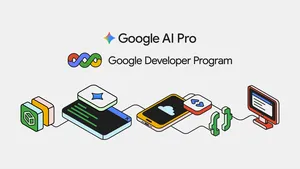Hufsa Munawar wants Pakistani women to feel safe online

“Despite the amazing talent we have in the Pakistan women, a lot of them are not comfortable being online for safety reasons,” says Hufsa Munawar. Hufsa is a community manager for Google who works with developers in Pakistan, and is extremely aware of the challenges women in her region face on the internet. Hufsa also manages Google’s Women Techmakers program, which recently brought online safety trainings for women in the area.
Together with Jigsaw, a team at Google that explores threats to open societies and builds technology to inspire scalable solutions, Women Techmakers has worked to bring online safety training to more and more women around the globe. “The workshop content really breaks down the major online security issues that exist, names them and gives suggestions for dealing with them,” Hufsa says. As a part of this program, the Women Techmaker ambassadors of Pakistan conducted eight online safety trainings and six ideathons to empower women to build solutions addressing online security concerns.
Hufsa Munwar

Hufsa and her team were able to train over 1,300 participants across six different cities in Pakistan — and 100% of the participants who shared their feedback said they’ve faced online safety-related issues in the past. More encouragingly, 86% said they learned something new from the online training that would make them feel safer online.
“It’s about creating awareness and education,” she says. “When you feel like it’s not just you experiencing these things, but also others in your community, you start to feel more comfortable and motivated to look for solutions.” During the training, participants shared examples of moments when they felt unsafe online, and later the group went through examples of online threat tactics — things like doxing, hacking, hate speech, violent threats, video or image-based abuse, misinformation, defamation, cyber harassment and impersonation.
After exploring these negative threats, they turned their attention to solutions during the ideathons. During the ideathons, each participant worked on proposing a solution for a problem statement given to them. These problem statements were selected from the training module and focused specifically on what women face online. “These sessions were so informative. I’ve been in tech for eight years, and I was learning new things about how these kinds of online issues can be resolved.”
One ideathon team in Karachi included a young woman who had faced online harassment for wearing a head covering. “She came up on stage and presented her idea for an app-based community where you could talk about the online hate you were facing and receive help from an AI-based system that offered ideas on what you could do, and I was really proud of her,” says Hufsa. “Her confidence, to me, was the most important thing. I loved that she understood why it’s important to form a community, felt comfortable sharing her previous experiences and proposed a unique solution to the problem.”
Hufsa sees the growing interest in these kinds of safety trainings as a sign that the power of community building is becoming better understood. “Our Women Techmaker ambassadors from Pakistan, Hira Tariq, Irum Zahra, Aiman Saeed, Ramsha Siddiqui and Annie Gul have laid down an excellent foundation for the conversation that needs to happen around women’s online safety.” she says. “This experience was so powerful because I saw that the participants trust the Women Techmakers ambassadors, and that they’re making real connections.” And the work continues: Hufsa says women who attended the workshop are requesting similar training sessions for their workplaces. “This was just the beginning. Our ambassadors and other friends in the community are working to continue training women in this space and make Digital Pakistan a safer and more inclusive space for our women.”







